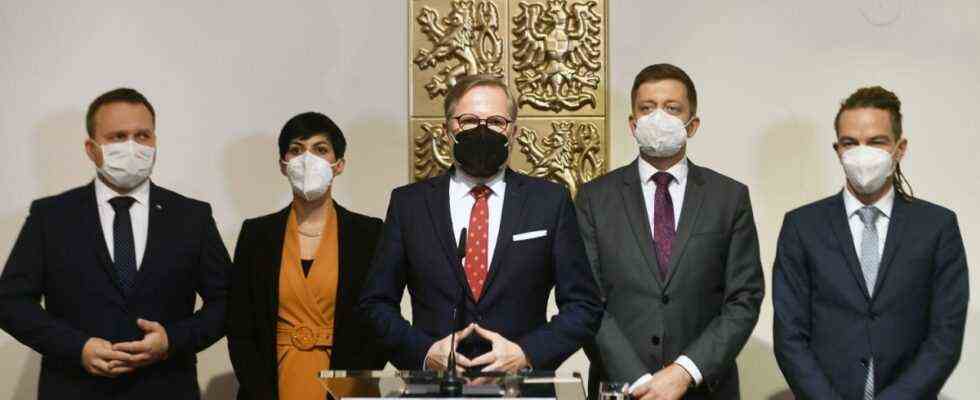Even before things really get going, the Czech Prime Minister Petr Fiala has passed two tests: He was able to prevail against President Miloš Zeman. And he has proven that he stands by his future ministers, including those who do not belong to his party.
President Zeman appointed a five-party coalition at Lány Castle west of Prague on Friday – including the Foreign Minister, against whom he had reservations. That is why Zeman had initially announced that he would not appoint 36-year-old Jan Lipavský, whereupon the accession of the government threatened to be delayed. Lipavský is a vocal critic of the Russian and Chinese regimes, while Zeman has already been described in the press as “Putin’s agent” and “China’s ambassador”.
But Petr Fiala stuck to Lipavský, even though he belongs to the left-wing liberal pirate party. Fiala himself is the head of the bourgeois ODS – both parties were deeply suspicious of each other for years. Considerable tensions in the upcoming cabinet were therefore feared, but Fiala was able to dispel the worries.
There has never been a coalition as large as that of the new prime minister in the Czech Republic. It took the entire democratic opposition to come up against the populist government of Andrej Babiš. Now Babiš has to join the opposition, which he shares with the right-wing extremists. Fiala’s government, however, has to resolve the reform backlog that has arisen over many years of chaotic governments, including Babiš. She has to disentangle the ministries and authorities from Babiš’s people and reconnect with Brussels. Babiš was in a dispute with the EU Commission because they accused him of a conflict of interests – because of his companies, which received millions in EU subsidies. The Budget Control Committee of the European Parliament found that many offices in the Czech Republic helped to ensure that the money was not always correctly distributed.
The new government is already historic
“We are facing big problems,” said Fiala on Friday. “Be it Covid, high energy prices, price increases, inflation and everything that goes with it.” The new cabinet met for the first time in the afternoon and discussed corona measures. The government does not want to ask the MPs to extend the state of emergency.
Everything about this new government is already historical, starting with the pictures of a president sitting in a plexiglass box in his baroque Lány castle. Zeman had been infected with corona, although he had been vaccinated three times. Nevertheless, the new prime minister and the ministers had to present themselves to him in person before their appointment; the showcase was there for their protection.
The five-member coalition is a mixed bag: Christian Democrats, commoners, liberals and the pirates who are more left-wing decreed. Fiala’s Civic Democrats Party (ODS) is the strongest group. Fiala, 57 years old and a university professor of politics as well as the former rector of Masaryk University in Brno, likes to support the state. He speaks cautiously, tries to balance things out, and he seldom expects to come to a head. His cabinet consists of 15 men and three women. In the House of Representatives, women make up a quarter of the members, more than ever. However, larger minorities such as Roma or Czechs of Vietnamese descent are not represented.
“We are change,” said Fiala on election night. The historian Jaroslav Miller considers it likely that this promise will be kept. “The new government has a strong will to reform,” says the long-time former rector of the Palacký University in Olomouc, praising him: “The new cabinet is significantly more competent than the previous one.” Unlike his predecessor Babiš, Fiala is capable of learning and takes advice.
Domestically, the government has great things to do. The first step is a pension reform that has been postponed for years. In addition, all parties have put apartment and rental prices on the agenda as a key issue. There is no tenant protection like in Germany in the Czech Republic, especially in the capital, many tenants only have fixed-term contracts and are at the mercy of property owners.
Like France, the Czech Republic continues to rely on nuclear energy
When reaching the climate targets, the following applies: no coal, yes nuclear power. Environment Minister Anna Hubáčková wants to work towards phasing out coal as early as 2030. But like France, even under the new government, the Czech Republic will insist that the EU recognize nuclear energy as an emission-free source of the climate. It is, however, ruled out that the planned kiln near Brno will be built by a Chinese or Russian company.
“The new government will be much more western, much more oriented towards the EU,” Miller believes. European cooperation in security and defense is important for the Czech Republic, even rapprochement with the euro zone is possible, says the historian. The government will hardly replace the Czech crown with the euro during its term of office, “but they can get this process off the ground.”
For Prime Minister Fiala, the search for candidates for the presidential election in January 2023 is more urgent. The head of state is elected directly by the people in the Czech Republic – and Zeman is no longer running. “The new government must find a strong, common candidate who can unite the democratic camp and help to end the populist era,” says Milan Nič from the German Society for Foreign Policy. Zeman is not a friend of the new government, he has shown that and has always supported Andrej Babiš. It is now expected that Babiš will run for president himself.
There is also a major task ahead of us in terms of foreign policy. In the summer of 2022, the Czech Republic will take over the EU Presidency. The country is said to be in a much better position than under Prime Minister Babiš, including his ongoing clinch with Brussels. Better than in 2009, too. At that time, during the Czech presidency in Prague, the government had collapsed.

